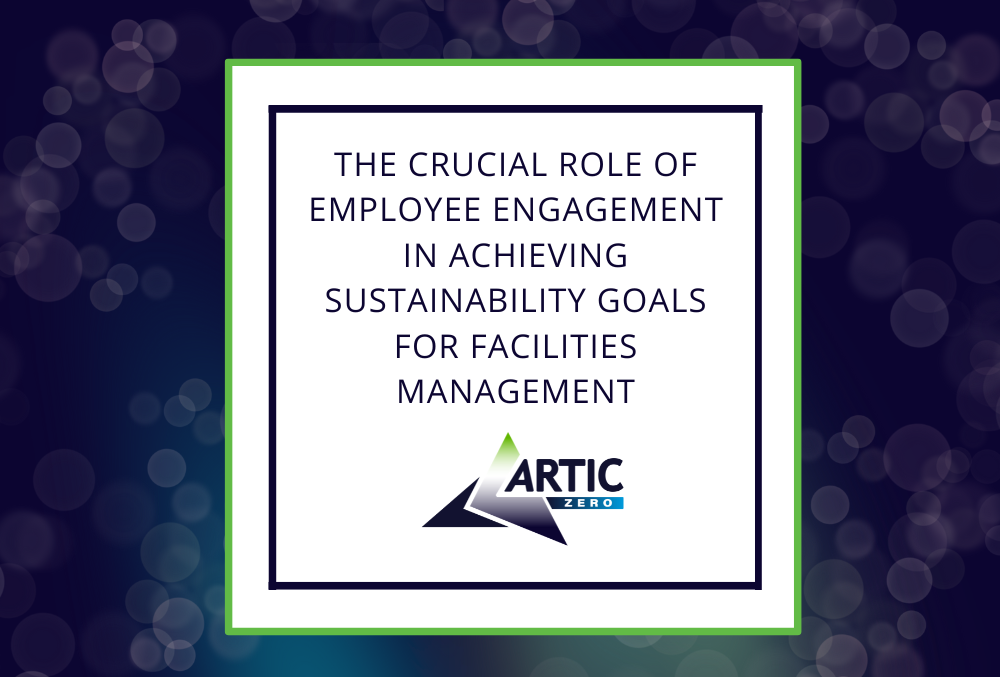
The Crucial Role of Employee Engagement in Achieving Sustainability Goals for Facilities Management
At Artic we are committed to promoting sustainability and assisting businesses in achieving their sustainability goals. In this blog, we will look at the crucial role of employee engagement in sustainability and the different benefits it can provide to companies.
In recent years sustainability has emerged as a crucial concern for businesses all over the world. With increased awareness about the environmental impact of corporate operations, businesses are under increasing pressure to minimise their carbon footprint and implement more sustainable practises. Employees’ importance in achieving sustainability goals cannot be underestimated, and businesses are beginning to appreciate the need of engaging and collaborating with their employees in order to succeed.
Companies are becoming increasingly aware of the importance of sustainability and the role that employees can play in achieving net zero goals. However, many organisations still struggle with how to engage and collaborate with their staff to achieve these goals.
The Importance of Employee Engagement in Sustainability:
Employee engagement in sustainability is important because it plays a crucial role in achieving an organisation’s sustainability goals. When employees are engaged in sustainability initiatives, they become more aware of the environmental impact of the organisation’s operations and are more likely to contribute to efforts to reduce that impact. This can lead to a range of benefits for the organisation, including increased job satisfaction, improved performance, enhanced retention rates, and stronger stakeholder relations.
Solutions for Engaging Employees in Sustainability for Facilities Management:
There are several solutions that can be implemented to engage employees in sustainability for facilities management:
- Provide training and development programs on sustainability, green buildings, and energy conservation practices.
- Identify the areas in which your employees need training and development. Develop the training program based on the identified training needs. Deliver the training program through various methods such as workshops, online courses, or in-person training sessions. Continuously review and update the training curriculum to ensure it remains relevant and effective.
- Create a sustainability committee that includes employee representatives from different departments.
- This can be achieved by identifying passionate employees and providing them with the necessary resources and support to effectively lead and manage the committee.
- Offer incentives for employees who suggest and implement sustainable practices and projects.
- You can offer incentives such as bonuses, recognition, or extra time off for employees who suggest and implement sustainable practices and projects. This can encourage employees to be more engaged in sustainability efforts and feel valued for their contributions.
- Develop a communication plan that informs employees of the organisation’s sustainability goals and progress.
- create a communication plan with regular updates and use various channels such as email, meetings, and notice boards.
- Host employee engagement activities, such as workshops, focus groups, and competitions.
- Establish a recognition program that acknowledges and rewards employees for their contributions to sustainability
- highlight their contributions through newsletters or on intranet, awarding certificates or badges, offering financial incentives, providing career advancement opportunities, and celebrating their achievements through events and recognition ceremonies.
Benefits of Employee Engagement in Sustainability for Facilities Management:
Employee engagement in sustainability initiatives for facilities management can bring numerous benefits to both employees and organisations. Some of these benefits include:
- Improved employee engagement and job satisfaction
- Increased awareness and understanding of sustainability and its importance.
- Reduced energy consumption and operating costs.
- Enhanced reputation and increased stakeholder engagement
- Attraction and retention of talented and environmentally conscious employees
- Alignment with the organisation’s sustainability goals and objectives.
- Reduced environmental impact and improved environmental performance.
- Increased operational efficiency and productivity.
Conclusion:
Employee engagement is crucial in achieving sustainability goals for facilities management. Engaged employees are more aware of the environmental impact of their organisation’s operations and are more likely to contribute to efforts to reduce that impact. By aligning with their sustainability goals and objectives, companies can reduce their carbon footprint, improve their environmental performance, and increase operational efficiency.
Share This Story!
If you're looking to partner with Artic Building, then please complete the Working With Artic form here.
Do you have an upcoming project or tender? Then please complete the form below.

